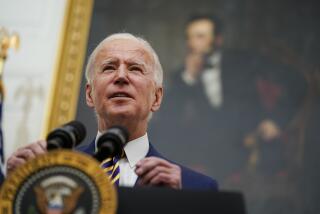Gore, Clinton, Off to Awkward Start, Now Called a Team
- Share via
WASHINGTON — Al Gore was puzzled, to put it mildly.
Bill Clinton was preparing for his first post-election press conference the following day and he still had not invited Gore to join him.
This slight--or was it an oversight?--was unsettling, coming a week after a campaign in which the two men repeatedly promised to work as partners. But some discreet, high-level staff work quickly straightened things out.
As Clinton strode into the sun-drenched Old Statehouse in Little Rock, Ark., the next day, there was Al Gore, barely a half-step behind the boss. And there, a near-motionless Gore stayed for the next hour, his arms dangling stiffly at his side as a confident Clinton fielded question after question, seemingly oblivious to the vice president-elect.
Before the nationally televised press conference was over, the barbs began: Al Gore is so wooden he gets his annual checkups at the National Forest Service--from a tree doctor. Even top members of his staff guffawed at that one.
But the aides got a jolt when they shared it with Gore, who has been known to let his hair down in private--balancing spoons on his nose, donning bloody vampire teeth on Halloween, and even, occasionally, poking fun at his own stiff image.
“Funny, huh!” a stone-faced Gore snorted, icily turning away.
In the weeks since then, if the former Tennessee senator has not entirely put an end to such derision, he appears to have solidified his working relationship with Clinton. Day after day, as the President-elect went about the task of forming a government, Gore sat at his elbow, debating the pros and cons of each job candidate, pushing some, opposing others.
Among those close to Gore who have been named to senior jobs in the new Administration are Carol Browner, a former staff member in Gore’s Senate office, as head of the Environmental Protection Agency; John H. Gibbons, head of the congressional Office of Technology Assessment, as White House science adviser; and Bruce Reed, a one-time Gore staffer who served as Clinton’s issues director during the campaign and, starting this week, becomes a deputy assistant to the President for domestic policy.
Clinton said in a Sunday television interview that Gore has played “an integral role” in the process, adding: “He’s won a lot more than he’s lost.”
The important thing, it seemed, was that Gore was at the table.
But that was the transition.
For Albert Arnold Gore Jr., 44, the true test is just now beginning.
As he took his place a heartbeat away from the presidency a few minutes before noon Wednesday, Gore embarked on a tricky balancing act for the next four or eight years. He must temper, on the one hand, his own desire to be President while, on the other, asserting himself when he needs to do so.
Gore’s ability to deftly juggle these competing demands will define not only his term in office but also his chances of becoming the unchallenged heir to the Oval Office in, say, the year 2000, when he will be 52 years old.
“It’s an awkward role to play,” said Thomas E. Mann, a presidential scholar at the Brookings Institution, a think tank here.
Since the only constitutionally prescribed duty of a vice president is to preside over the Senate, Mann noted, “for Gore to play a meaningful, constructive role, Bill Clinton has to decide to have him play that role. Clinton is the only one who can do that.”
Many Gore friends and close associates insisted that he couldn’t be happier.
“It’s clear that Bill Clinton has delivered on his promise to make this vice presidency one of the most responsible positions it’s ever been,” Robert D. Squier, a veteran Democratic operative and Gore family friend, said last week. “Al seems very happy.”
More to Read
Get the L.A. Times Politics newsletter
Deeply reported insights into legislation, politics and policy from Sacramento, Washington and beyond. In your inbox twice per week.
You may occasionally receive promotional content from the Los Angeles Times.










